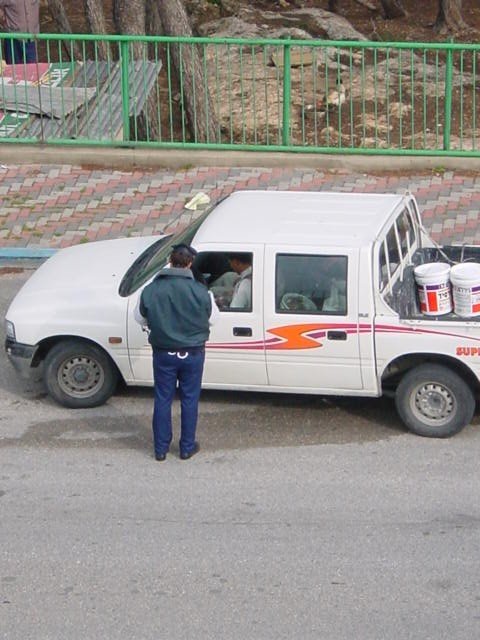April 4, 2002
An Israeli police checkpoint on the outskirts of Jaffa, Nazareth, an Arab Israeli town.
Woke up to a police radio - on the main road outside where we're staying, a police checkpoint had been set-up to pull-over vehicles selectively and question the drivers. These are fairly typical in Israel anyway, and with the fear of suicide bombings, they're omnipresent. Can't help but wonder what kind of instructions these police may have received for profiling young Arab men.
We're exhausted, but it's hard to rest. We're trying to find a balance between taking care of ourselves and hoping to have some positive impact on the crisis. This is exacerbated by the fact that we have no contact at all with Zababdeh - yesterday it was the land telephone lines, but today it's the mobile phones, too. We know that Zababdeh is small potatoes compared to nearby Jenin, but that offers little comfort - we have many students and friends there, too.
We have been able to get through to friends in that city - constant shelling, tanks, air power, that we could hear in the background. There's no electricity and no one dares go outside, but to date the water hasn't been cut. Even so, they're very worried.
The Ramallah stories of house-to-house searches and arrests are all so disturbing, even when people are found "innocent" - whatever that means these days. On a practical level, though, with no electricity in Jenin their perishables will go bad. Then what? Word from Ramallah is that, when the curfew is lifted for a few hours, people go to buy bread at bakeries that have no flour and essentials at stores that have been ransacked by Israeli soldiers.
One friend in Jenin, when we told him we were praying for their safety, said, "Pray for the Israelis, too. As Christians, we don't want anyone to be killed. And pray for Sharon. We hope he will open his eyes to see the truth." Listening to someone under siege with words like that brought tears to our eyes.
We talked to our Dutch friend in Nablus - as a nurse, she decided to stay for the invasion, and her organization agreed that she should. She's staying at the Anglican hospital, since there is a total curfew in effect. They have no electricity and are operating on generators there. The Anglican compound at the Old City has a tank parked right in front of it - we haven't heard from Fr. Hossam, but are sure he's staying low.
Zababdeh remains foremost in our minds, though. We heard from various friends today who had to leave their international assignments in Beirut, Tehran, and Chile. As one friend consoled us about the difficulty of leaving, she said, "It's agonizing. We left Beirut three times and came back twice."
We also heard indirectly from an Israeli friend who is back in the reserves. He had filed as one of the "refusenik" soldiers, but everything happened so fast that he suddenly found himself in Ramallah doing house-to-house searches. His previous tour of duty on the West Bank and the horrors he was forced to witness convinced him that the Occupation was wrong and that it was up to soldiers to end it. And now he's back in it, feeling that he can't abandon his fellow soldiers in "war" and wouldn't know how to leave, anyway. Can't help but feel some kindredness with him, given our recent flight. Can't help but feel angry with him either, wondering how many soldiers like him are simply going along and "just following orders," though in their heart of hearts they know that they are wrong. Can't help but worry about his safety, either - he's a thoughtful, caring, philosophical young man.
We did take a break to have lunch with friends who are working in Ibillin with Fr. Chacour's Mar Elias College, as well as our gracious hosts here in Nazareth. We dined at an Arab-owned restaurant with largely Arab clientele - the place was practically empty, though. The restaurant business is down drastically because of the fear of suicide bombings. Of course, it was 2:30 in the afternoon by the time we got there. We've been discussing lending our time and talents to folks up here while we're "out", since it looks like it'll be a while longer than we hoped before we can return. We're expecting to help out, but our first priority is Zababdeh and the situation in the West Bank.
We finally got word from there - a text message via cellphone: "NOW THEY START IN QABATYA SO WE HAVE BAD SITUATION." Allah ma'kum - God be with you.

